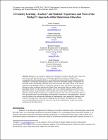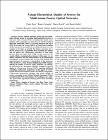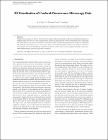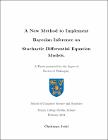Browsing Computer Science by Title
Now showing items 1-20 of 2087
-
1st Workshop on Context Representation in User Modelling
(Association for Computing Machinery, New York, NY, USA, 2023)Context, a critical aspect of personalisation and human-computer interaction, is becoming increasingly significant with the prolif- eration of user-centric applications. The First ACM Workshop on Context Representation ... -
21 Century Learning -Teachers' and Students' Experiences and Views of the Bridge21 Approach within Mainstream Education
(AACE., 2013)Bridge21 is an innovative approach to learning for secondary education that is team and project based and that takes place in a technology mediated environment. Bridge21 was conceptualised and structured initially as an ... -
3-stage Hierarchical Quality of Service for Multi-tenant Passive Optical Network
(2019)Passive Optical Networks (PONs) are an economically efficient means of providing high bandwidth services to end users. This is because PONs are multi-point shared access medium, where end-points can share the cost ... -
3D visualisation of confocal flourescence microscopy data
(2004)Confocal microscopes are able to non-invasively capture sub-micron details of fluorescent-labelled specimens at multiple depths, but there is a lack of applications capable of displaying this collected information in a ... -
A case study of Action Design Research for privacy risk management engineering
(Trinity College (Dublin, Ireland). School of Computer Science & Statistics, 2014)This dissertation presents a case study concerning the application of the Action Design Research (ADR) methodology to the development of a privacy-enhanced electronic postal system. As part of the ADR project, a model of ... -
A convex optimisation approach to optimal control in queueing systems
(Trinity College (Dublin, Ireland). School of Computer Science & Statistics, 2017)Convex optimisation and max-weight are central topics in networking and control, and having a clear understanding of their relationship and what this involves is crucial from a theoretical and practical point of view. In ... -
A cross-cultural exploration of online community newcomer behaviour
(Trinity College (Dublin, Ireland). School of Computer Science & Statistics, 2016)As Internet use has become globally pervasive, the literature suggests that national culture is having an impact on online community communication practices. The importance of researching national culture in these spaces ... -
A delay and disruption tolerant transport layer protocol
(Trinity College (Dublin, Ireland). School of Computer Science & Statistics, 2008)The area of delay-tolerant networking (DTN) is concerned with highly challenged networks in which application layer "sessions" commonly lack contemporaneous end-toend connectivity. For example, efforts to create networks ... -
A dependency modelling approach for the management of ontology-based integration systems
(Trinity College (Dublin, Ireland). School of Computer Science & Statistics, 2011)Ontology-based approaches that formally represent the meaning of information in a system, offer the hope of dealing with semantic heterogeneity when integrating heterogeneous data sources [Halevy 2001, Noy 2004, Wache et ... -
A domain knowledge driven information uplift approach for network monitoring
(Trinity College (Dublin, Ireland). School of Computer Science & Statistics, 2014)With the advance of modern network technologies, people now enjoy increased convenience whilst occasionally suffering annoyance from network issues by lacking domain expertise. In the Home Area Network (HAN), these issues ... -
A flexible explanation system for case-based reasoning
(Trinity College (Dublin, Ireland). School of Computer Science & Statistics, 2006)Artificial Intelligence systems have reached a level of sophistication and accuracy which means that they can now be confidently used as decision aids in real world situations. However, although these systems are accurate, ... -
A flexible framework for distributed shared objects
(Trinity College (Dublin, Ireland). School of Computer Science & Statistics, 2002)A distributed shared memory (DSM) system ensures the consistency of shared data in a distributed system while providing the programming paradigm of a single-processor system. Recent DSM systems provide increasingly more ... -
A framework for instrument monitoring on the grid
(Trinity College (Dublin, Ireland). School of Computer Science & Statistics, 2006)Grid computing enables the selection and aggregation of a wide variety of geographically distributed resources as a single unified computing resource, for solving large scale compute and data intensive computing ... -
A framework for the delivery and evaluation of personalised multilingual information retrieval
(Trinity College (Dublin, Ireland). School of Computer Science & Statistics, 2014)The amount of content provided in different languages on the Web is growing every day. The best answer to a user's query may not necessarily be available in his/her own language, but may reside in the diverse, multilingual ... -
A generic framework for grid-enabled visualisation and computational steering, and its characterisation
(Trinity College (Dublin, Ireland). School of Computer Science & Statistics, 2011)This thesis presents a generic framework for grid-enabled visualisation and computational steering that is amenable to characterisation using mathematical models based on benchmarked resources. The models enable designers, ... -
A holistic approach to mobile robot navigation using omnidirectional vision
(Trinity College (Dublin, Ireland). School of Computer Science & Statistics, 2002)This dissertation presents a novel methodology for vision-based robot navigation. One of the key observations is that navigation systems should be designed through a holistic approach, encompassing aspects of sensor design, ... -
A knowledge-light approach to regression using case-based reasoning
(Trinity College (Dublin, Ireland). School of Computer Science & Statistics, 2007)Case-based reasoning (CBR) is among the most influential paradigms in modern machine learning. It advocates a strategy of storing specific experiences in the form of cases, and solving new ... -
A model for mobile spatial services
(Trinity College (Dublin, Ireland). School of Computer Science & Statistics, 2009)Mobile context-aware computing is a paradigm in which mobile devices have access to information, known as context, about the situation in which they are being used, and dynamically adapt application behaviour to support ... -
A multi-faceted model of trust that is personalisable and specialisable
(Trinity College (Dublin, Ireland). School of Computer Science & Statistics, 2007)Trust is a term that is open to a wide range of subjective interpretations, and it has therefore been argued that “trust is a fashionable but overloaded term with lots of intertwined ... -
A new method to implement Bayesian inference on stochastic differential equation models
(Trinity College (Dublin, Ireland). School of Computer Science & Statistics, 2011)Stochastic differential equations (SDEs) are widely used to model numerous real-life phenomena. However, transition densities of most of the SDE models used in practice are not known, making both likelihood based and ...























